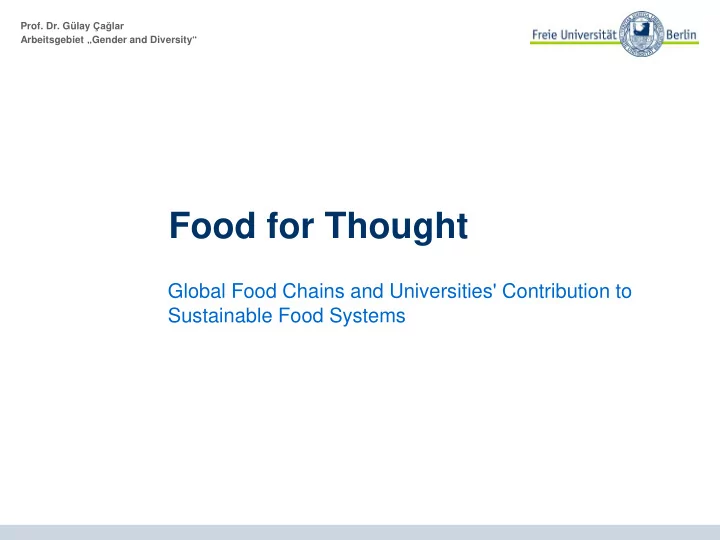

Prof. Dr. Gülay Çağlar Arbeitsgebiet „Gender and Diversity“ Food for Thought Global Food Chains and Universities' Contribution to Sustainable Food Systems
Content 1.Food quality – why has this become an important issue? 2.Global food chains and intensive agriculture What are problems from an environmental perspective? What are problems from a gender perspective? 3.Sustainable food systems – how can Universities contribute? Prof. Gülay Çağlar 2
1. Food Quality Prof. Dr. Gülay Caglar 3
1. Food Quality A pesticides residues B spoiled foodstuff C residues of veterinary medicinal products and hormones D unbalanced diet E mold poison F irradiated foodstuff G genetically modified foodstuff H alcohol I food additives J cholesterol K natural toxicants L raw foodstuff M biotechnologically modified foodstuff N ascorbic acid O none of these risks P don‘t know Source: Nationale Verzehrstudie II 2008, 115 Prof. Gülay Çağlar 4
2. Global Food Chains & Intensive Agriculture Universities offer food and meals for thousands of students and staff members on a daily basis. They need large amounts of foodstuff. Not easy to cover needed amounts from local small- scale farmers. They rely on the conventional food system based on intensive agriculture with high inputs of agro- chemicals (i.e. fertilizers, pesticides, hybrid seeds). Universities are actors in the global food chain. Prof. Gülay Çağlar 5
Source: Royal Tropical Institute 2011 Prof. Gülay Çağlar 6
2. Global Food Chains & Intensive Agriculture Negative environmental, economic and social effects caused by intensive agriculture: − air and water pollution/contamination − soil losses (regarding topsoil and nutrient) − loss of biodiversity (increased use of hybrid seeds) − health problems − price pressure (the longer the value chain the higher the economic pressure on farmers) − food insecurity Value chain analysis is largely gender blind. Prof. Gülay Çağlar 7
2. Global Food Chains & Intensive Agriculture Feminist Political Ecology regards gender as a constitutive factor that influences socio-ecological and economic outcomes. Gendered power relations are (re)produced through daily material practices (food production, meal preparation etc.) − Women work as low-paid labourers or as unpaid family farmers. − They do not own the land and, as a consequence, lack decision-making power. − Their bargaining power along the value chain is weak. Prof. Gülay Çağlar 8
3. Sustainable Food Systems Food systems approach is more holistic. It encompasses all activities along the value chain. But additionally focuses at the interaction between geophysical, socio-ecological and socio-economic environments. From a food systems perspective the University is not only a consumer. What could be the role of Universities? Prof. Gülay Çağlar 9
3. … and Universities‘ contribution Campus sustainable food projects Four components (Barlett 2011, 102): − dining service innovations in procurement, menus, and kitchen operations; − academic and co-curricular programs; − direct-marketing such as community supported marketing and farmers markets; − direct experiences such as community gardening or campus farms. Prof. Gülay Çağlar 10
3. … and Universities‘ contribution? Are you aware of any projects, initiatives etc. of your University that might contribute to sustainable food systems? Examples? Prof. Gülay Çağlar 11
Thank you! Prof. Gülay Çağlar 12
Recommend
More recommend